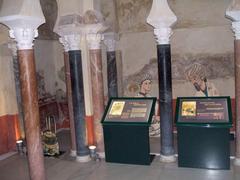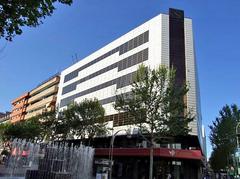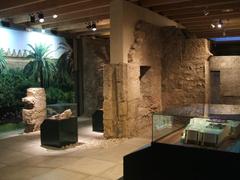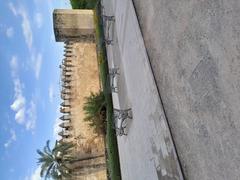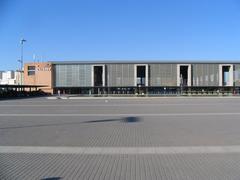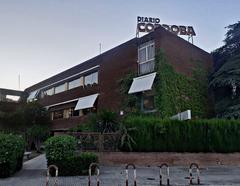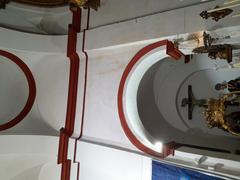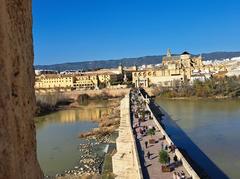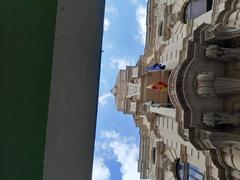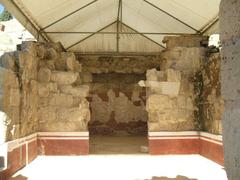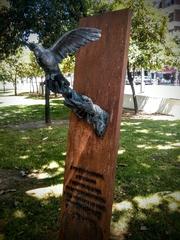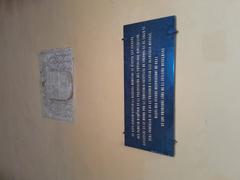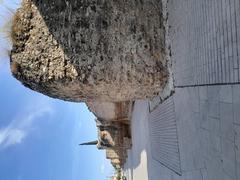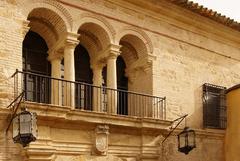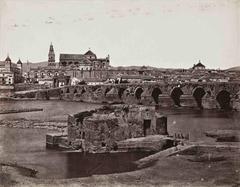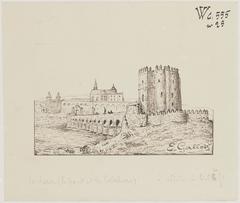University of Córdoba Visiting Hours, Tickets, and Historical Sites Guide
Date: 14/06/2025
Introduction
The University of Córdoba (Universidad de Córdoba, UCO), located in Andalusia, Spain, serves as a unique intersection of academic excellence and rich cultural heritage. While it was officially established in 1972, the university draws deeply from Córdoba’s historic reputation as a center of learning during the Caliphate era. Today, UCO integrates seamlessly with the city’s historic quarters, offering visitors opportunities to explore both modern educational facilities and centuries-old architectural gems. The proximity to landmarks such as the Mezquita-Catedral, Alcázar de los Reyes Cristianos, and the Jewish Quarter makes the university an essential stop for travelers seeking to immerse themselves in Córdoba’s academic and cultural legacy.
This detailed guide provides essential information on visiting hours, ticketing, guided tours, accessibility, and nearby attractions, ensuring your visit is both enjoyable and informative. For the latest updates, always refer to the official University of Córdoba website. Additional insights and mobile guides are available through resources such as Explorial and Turismo de Córdoba.
Table of Contents
- Welcome to the University of Córdoba
- Historical Foundations
- Campus Structure and Locations
- Facilities and Infrastructure
- Academic Excellence and Research
- Visiting the University: Practical Information
- Student Life and Support Services
- Integration with Córdoba’s Heritage Sites
- Architectural and Cultural Highlights
- Nearby Attractions
- Cultural Engagement and Academic Events
- Practical Tips for Visitors
- Frequently Asked Questions (FAQ)
- Plan Your Visit
Welcome to the University of Córdoba: A Must-Visit Historical and Cultural Site
UCO is more than an educational institution. It is a living symbol of Córdoba’s enduring commitment to scholarship, blending historic architecture, vibrant student life, and close connections to the city’s renowned heritage sites. Whether you are an academic, a prospective student, or a traveler, the university offers a unique window into Andalusia’s intellectual and cultural traditions.
Historical Foundations
Córdoba’s history as a city of knowledge dates back to the Islamic rule of Al-Andalus, when it was famed for its libraries and scholars. The Caliphate’s legendary library once housed hundreds of thousands of volumes. While the university in its current form was founded in 1972, it evolved from earlier institutions such as the Faculty of Veterinary Science (established in 1917). Today, UCO continues this legacy with over 18,000 students and a diverse portfolio of academic programs.
Campus Structure and Locations
UCO’s multidisciplinary approach is reflected in its four main campuses:
- Rabanales Campus: East of Córdoba, this is the largest and most technologically advanced, hosting sciences, veterinary medicine, and engineering faculties. It features cutting-edge laboratories and the Rabanales 21 Science and Technology Park (TopUniversities; Edarabia).
- Health Sciences Campus: Located in the west, this campus is dedicated to health disciplines and is closely integrated with Reina Sofía University Hospital.
- Legal and Social Sciences Campus (Campus Centro): Situated in the historic center, it houses the faculties of Law, Economics, Business, and Humanities, offering direct access to the city’s major historical sites.
- Polytechnic School of Belmez: About 60 km from the city, specializing in engineering and technical studies (ShanghaiRanking).
Facilities and Infrastructure
Rabanales Campus
- Aulario Lecture Hall: Modern teaching facilities with advanced audiovisual equipment.
- Juan XXIII Assembly Hall: A venue with panoramic views, hosting major events.
- Clinical Veterinary Hospital: Among Spain’s most advanced, offering practical training and services.
- Main Library: Extensive print and digital collections.
- Sports Facilities: Gyms, courts, and fields for student recreation.
- Lucano Residence Hall: On-campus accommodation.
- Rabanales 21 Technology Park: Fostering innovation and university-industry collaboration.
Health Sciences Campus
- Reina Sofía University Hospital: Integrated for clinical education.
- Specialized Laboratories: Supporting research in medicine, nursing, and biomedicine.
Legal and Social Sciences Campus
- Historic Buildings: Combining heritage with modern learning spaces.
- Central Library and Study Areas: Focused on humanities and social sciences.
Additional Facilities
- Language Center (UCOIDIOMAS): Spanish language and culture courses for visitors and international students.
- Transportation: Rabanales campus is accessible by a dedicated train station and city bus lines.
Academic Excellence and Research
Rankings and Reputation
UCO is ranked among Spain’s top universities, appearing in the QS World University Rankings 2025 (#951–1000) and excelling in fields such as Agriculture & Forestry (TopUniversities). It is also recognized by the Shanghai Academic Ranking for its research impact (ShanghaiRanking).
Research Focus Areas
- Agriculture and Food Sciences: Internationally renowned for agribusiness and environmental science.
- Veterinary Medicine: Andalusia’s leading faculty with a strong reputation.
- Health Sciences: Noted for medical and biomedical research.
- Humanities and Social Sciences: Active in law, economics, history, and cultural studies.
UCO supports over 200 research teams and 1,000+ scientists engaged in national and European projects (ShanghaiRanking).
Innovation and Industry Partnerships
Through its research transfer office and Rabanales 21, the university actively fosters innovation and entrepreneurship.
Visiting the University: Practical Information
Visiting Hours and Ticket Information
- General Hours: Most buildings are open Monday to Friday, 8:00 AM to 8:00 PM. Some, like the Faculty of Philosophy and Letters and the Royal Botanic Garden, may have more limited hours (typically 9:00 AM to 6:00 PM).
- Entry Fees: Public campus grounds are generally free. The Royal Botanic Garden charges a modest fee (around €3; discounts for students and seniors). Guided tours and special exhibitions may require advance booking and fees.
Accessibility
All main campuses are accessible, with ramps, elevators, and adapted restrooms. Public transport and on-campus parking (including spaces for disabled visitors) make it easy to reach the university.
Guided Tours and Special Events
- Guided Tours: Available at key campuses and historic sites. Booking in advance is recommended, especially for groups or during cultural festivals.
- Cultural Events: UCO hosts public lectures, art exhibitions, and concerts, many free or low-cost.
Photographic Spots and Cultural Activities
- Highlights: The Juan XXIII Assembly Hall tower, patios at historic buildings, and green spaces across campuses.
- Cultural Activities: Lectures, exhibitions, and festivals celebrating Andalusian heritage are open to the public.
Travel Tips for Visitors
- Best Time to Visit: Spring (March–May) and autumn (September–November) offer pleasant weather and coincide with major festivals.
- Getting Around: Use public transport or walk; parking is limited in the city center.
- Dining: On-campus cafeterias and nearby restaurants serve local cuisine.
- Language: Spanish is predominant; some English support is available.
Student Life and Support Services
UCO supports a diverse academic community of nearly 19,000 students, with comprehensive services including international support, scholarships, health programs, student associations, and a range of sports and cultural activities (ShanghaiRanking).
Integration with Córdoba’s Heritage Sites
UCO’s central locations allow easy exploration of major attractions:
- Mezquita-Catedral: A UNESCO World Heritage Site, blending Islamic and Christian architecture.
- Alcázar de los Reyes Cristianos: Fortress-palace with stunning gardens.
- Jewish Quarter: Historic streets, artisan shops, and tapas bars.
- Calleja de las Flores: One of Córdoba’s most photogenic spots (Explorial).
During events like the Fiesta de los Patios, university courtyards participate in the city’s famous flower festival (Turismo de Córdoba: Events and Festivals).
Architectural and Cultural Highlights
- Faculty of Philosophy and Letters: Set in an 18th-century baroque building, featuring a tranquil courtyard.
- Royal Botanic Garden: Mediterranean flora, paleobotanical museum, and guided tours.
- University Museums: Collections on natural history, archaeology, and art, often accessible during public events.
Nearby Attractions
Enhance your visit with these nearby sites:
- Mosque-Cathedral of Córdoba (La Mezquita): Iconic monument with daily visiting hours (generally 10:00 AM–6:00/7:00 PM; closed January 1, May 1, and December 25) (Mosque-Cathedral official website).
- Alcázar de los Reyes Cristianos: Medieval fortress with gardens and historical displays.
- Roman Bridge: Scenic crossing of the Guadalquivir River.
- Local Markets: Artisan crafts and souvenirs at places like Zoco Municipal de Artesanía (Explored by Marta).
Cultural Engagement and Academic Events
UCO is a hub for cultural life, regularly organizing:
- Conferences and public lectures on history, art, and science.
- Exhibitions, music workshops, and local crafts fairs.
- Participation in city-wide festivals like Semana Santa and Feria de Córdoba (Turismo de Córdoba: What to Do).
Practical Tips for Visitors
- Weather: Spring and autumn offer the most comfortable climate.
- Timing: Visit early or late in the day for cooler temperatures and fewer crowds.
- Amenities: Accessible restrooms and information desks are available at main entrances.
- Dining: Try local specialties such as salmorejo and flamenquín at nearby eateries.
Frequently Asked Questions (FAQ)
Do I need tickets to visit the University of Córdoba?
Most areas are free; guided tours or exhibitions may require tickets.
What are the visiting hours?
Generally, Monday to Friday, 8:00 AM to 8:00 PM. Specific sites may differ.
Are guided tours available?
Yes, especially at main campuses and during cultural events. Book in advance.
Is the university accessible for people with disabilities?
Most buildings have ramps, elevators, and adapted restrooms.
Can I visit during local festivals?
Yes, with special events and open spaces during festivals like Fiesta de los Patios.
Plan Your Visit
To ensure a smooth experience, check the official University of Córdoba website for up-to-date visiting hours, ticketing, and guided tour availability. Enhance your journey with digital guides such as the Audiala app, and follow the university’s social media channels for the latest news on exhibitions and cultural programs.
Summary
Visiting the University of Córdoba offers a multifaceted experience—combining academic exploration, cultural immersion, and architectural discovery. With accessible campuses, engaging events, and a location at the heart of one of Spain’s most historic cities, UCO is an essential stop for any traveler to Andalusia. Plan ahead, explore both the university and its surrounding landmarks, and enjoy the vibrant atmosphere that defines Córdoba.
References
- University of Córdoba Official Guide
- TopUniversities: Universidad de Córdoba
- Edarabia: University of Córdoba
- ShanghaiRanking: University of Córdoba
- University of Córdoba Guide
- Explorial: Calleja de las Flores
- Turismo de Córdoba: Places to Visit
- Turismo de Córdoba: Events and Festivals
- The Gap Decaders: Cordoba Travel Guide
- Sommertage: Cordoba Travel Tips
- Explored by Marta: Hidden Gems in Córdoba
- Mosque-Cathedral Official Website
